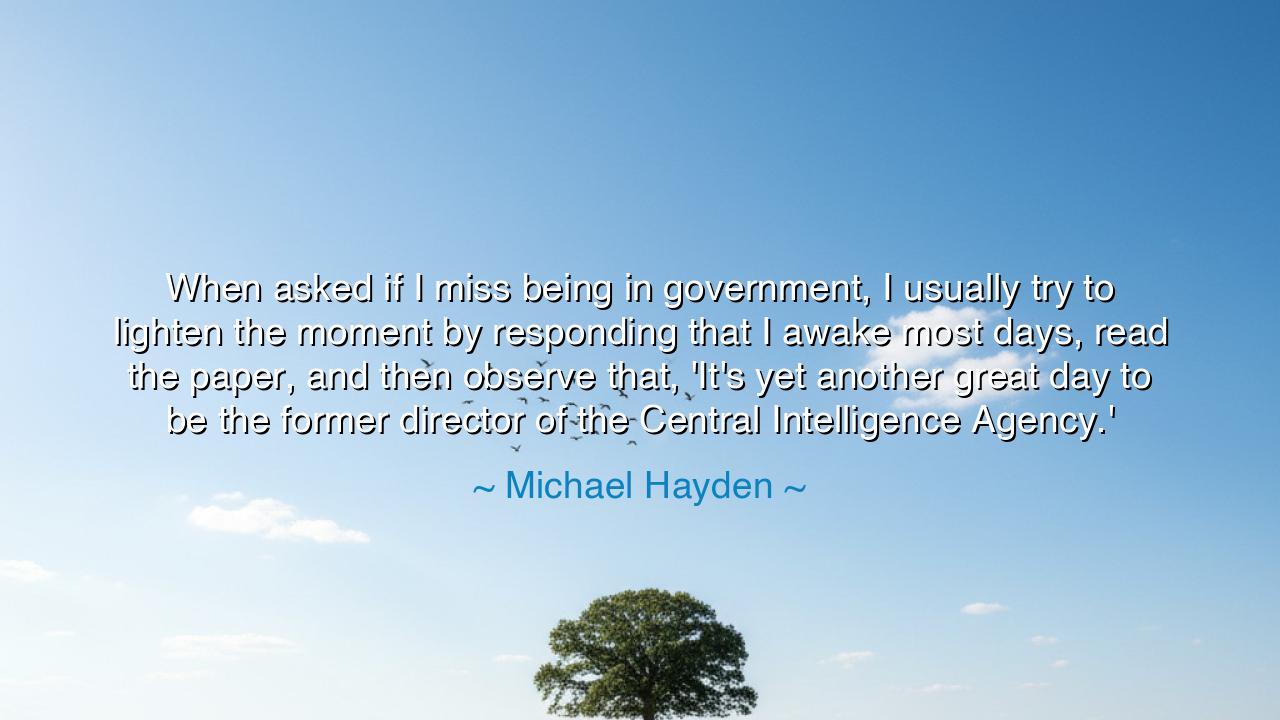
When asked if I miss being in government, I usually try to
When asked if I miss being in government, I usually try to lighten the moment by responding that I awake most days, read the paper, and then observe that, 'It's yet another great day to be the former director of the Central Intelligence Agency.'






The words of Michael Hayden, spoken with the tempered humor of a man who has carried the weight of secrets and power, resound with both irony and wisdom: “When asked if I miss being in government, I usually try to lighten the moment by responding that I awake most days, read the paper, and then observe that, ‘It’s yet another great day to be the former director of the Central Intelligence Agency.’” On the surface, the statement glimmers with wit—a simple jest from a man who once stood at the helm of the world’s most secretive institution. But beneath that humor lies a profound meditation on power, responsibility, and release. Hayden’s words reveal the heavy price of leadership in the shadows and the rare peace that comes only when one has walked through the storm and learned to lay down the sword.
As the former Director of the CIA and the NSA, Hayden bore the burden of intelligence, war, and consequence. He lived among decisions that shaped history yet were too secret to be shared, victories unsung, failures magnified. The world he inhabited was one where moral clarity was blurred by necessity, and where truth itself could be both weapon and shield. To awaken each morning as a private man, no longer bound by those invisible chains, was not merely freedom—it was rebirth. His words are those of a soldier who has returned from a long campaign, grateful to breathe without armor, to watch the battlefield from afar and no longer be its commander.
In saying, “It’s yet another great day to be the former director,” Hayden acknowledges both the gravity and isolation of high command. In government, every dawn brings new crises, every headline another storm. But in retirement, he can meet those same headlines as an observer, no longer as one whose signature might ignite or extinguish wars. There is wisdom in his laughter—it is not mockery, but relief. It is the laughter of one who has learned that great power is not only a privilege, but a profound weight upon the soul. And when that weight is finally lifted, even the ordinary—reading the morning paper—becomes an act of quiet joy.
History knows many such moments of release. Consider Cincinnatus, the Roman farmer called from his fields to save the Republic. He took command, defeated his enemies, and when victory was his, he did not cling to power. He returned to his plow, choosing the serenity of the soil over the splendor of rule. His story has endured because it speaks to the nobility of stepping down—the rare courage not just to lead, but to let go. So too does Hayden’s jest echo the same timeless lesson: that those who have wielded power most wisely are those who have known when to surrender it.
Yet there is another truth beneath his words—a subtle melancholy. For to “miss government” is to miss purpose, to miss the heat of responsibility that once gave shape to every hour. And so Hayden’s humor also conceals memory: of late nights in command centers, of moral dilemmas faced in silence, of comrades lost in wars unseen. His lighthearted tone is the cloak of a man who has seen too much, who has lived where the moral world bends under the pressure of survival. His laughter is not denial—it is grace, the kind that comes only when one has made peace with the shadows.
From his reflection emerges a lesson for all who seek greatness: the pursuit of power must always end in the humility of perspective. To lead well is to carry the burden, but to step away well is to understand that no one is meant to carry it forever. Hayden reminds us that wisdom lies not only in action, but in detachment—in knowing when to relinquish control, when to allow the next generation to take up the mantle. Just as he rises each morning thankful to no longer bear that weight, so must we learn to welcome the passing of seasons, the turning of roles, the liberation that comes from trust and surrender.
Therefore, O listener, take this teaching to heart: to serve is noble, but to release is divine. When the time comes to lay down the tools of your labor, do so not with bitterness but with gratitude. Celebrate the new dawns that come without duty, the peace that follows responsibility fulfilled. For every soul, like Hayden’s, must one day awaken and say, “It is a great day to no longer be what I once was.” This is not decline—it is completion, the quiet triumph of a life well-lived.
And so let his humor remind you: there is wisdom in laughter, and freedom in perspective. Power will pass, duty will fade, but integrity endures. Serve your cause with courage, then release it with grace. For when you can look upon the world’s turmoil with compassion rather than burden, when you can read the morning’s news and feel peace instead of pressure, then you, too, will know the joy of Hayden’s words—that rare, sacred joy of waking each day and saying, with both humility and satisfaction, “It is another great day to be free.”






AAdministratorAdministrator
Welcome, honored guests. Please leave a comment, we will respond soon